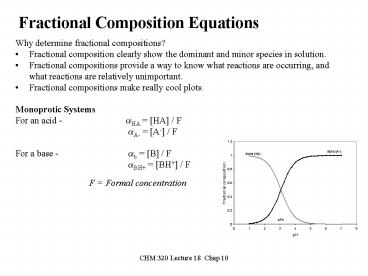Fractional Composition Equations - PowerPoint PPT Presentation
1 / 7
Title:
Fractional Composition Equations
Description:
Fractional composition clearly show the dominant and minor species in solution. ... Draw the structure and the fractional composition of the principal species of 1, ... – PowerPoint PPT presentation
Number of Views:353
Avg rating:3.0/5.0
Title: Fractional Composition Equations
1
Fractional Composition Equations
- Why determine fractional compositions?
- Fractional composition clearly show the dominant
and minor species in solution. - Fractional compositions provide a way to know
what reactions are occurring, and what reactions
are relatively unimportant. - Fractional compositions make really cool plots.
- Monoprotic Systems
- For an acid - ?HA HA / F
- ?A- A- / F
- For a base - ?b B / F
- ?BH BH / F
- F Formal concentration
2
Diprotic Systems For an acid - ?H2A H2A /
F ?HA- HA- / F ?A2- A-2 / F F
Formal concentration
3
Calculating Fractional Compositions from H and
Kas For an acid H2A ?H2A H2A / F
?HA- HA- / F ?A2- A-2 / F F
Formal concentration ?H2A H2 / D ?HA-
H Ka1 / D where D H2 H Ka1
Ka1Ka2 ?A-2 Ka1Ka2 / D
4
Biochemical terms Isoionic pH pH of a
solution where the pure, neutral polyprotic acid
has been dissolved. Isoelectric pH pH of a
solution when the average charge on the
polyprotic acid is 0. The isoelectric pH is
useful for separating various polyprotic acids
from one another. If you put these acids in a
electric field and a pH gradient, they will focus
themselves in a region of the pH corresponding to
their isoelectric pH (they do not move toward the
positive or negative pole).
5
Diprotic Buffers treated similar to a
monoprotic buffer. You must know what the
desired pH and the appropriate pKa are. pH pKa
log base/acid
6
Buffer problem How many grams of NaHCO3 (FM
84.007) must be added to 4.00 g of K2CO3 (FM
138.206) to give a pH of 10.80 in 500 mL of
water? What will be the pH if 100 mL of 0.1
M HCl are added to above solution?
7
Draw the structure and the fractional composition
of the principal species of 1,3-dihydroxybenzene
at the following pH values (pKa1 9.30
pKa2 11.06) pH 9 pH 11

